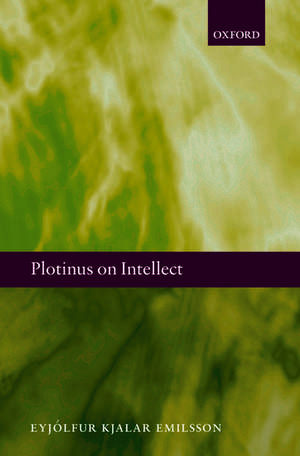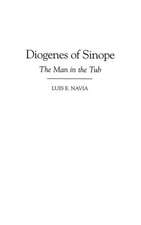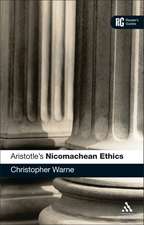Plotinus on Intellect
Autor Eyjólfur Kjalar Emilssonen Limba Engleză Hardback – 15 feb 2007
Preț: 598.19 lei
Preț vechi: 905.55 lei
-34% Nou
Puncte Express: 897
Preț estimativ în valută:
114.48€ • 119.08$ • 94.51£
114.48€ • 119.08$ • 94.51£
Carte tipărită la comandă
Livrare economică 03-09 aprilie
Preluare comenzi: 021 569.72.76
Specificații
ISBN-13: 9780199281701
ISBN-10: 019928170X
Pagini: 242
Dimensiuni: 160 x 240 x 20 mm
Greutate: 0.51 kg
Editura: OUP OXFORD
Colecția OUP Oxford
Locul publicării:Oxford, United Kingdom
ISBN-10: 019928170X
Pagini: 242
Dimensiuni: 160 x 240 x 20 mm
Greutate: 0.51 kg
Editura: OUP OXFORD
Colecția OUP Oxford
Locul publicării:Oxford, United Kingdom
Recenzii
A few years ago it would have been neccessary to begin this review by explaining, even to an erudite philosophical audience, who Plotinus was and why he had any important contribution to make to modern philosophy. Times are changing: recent discursive histories of the subject... all acknowledge Plotinus' historical significance and his charm. Emilsson's study will be of interest both to those already acquainted with his work and to those attracted to the topic by such recommendations... this is a welcome addition to the literature, much of which will be intelligible even to undergraduate student.
Emilsson's thoughtful discussion is expressed in language that is, if not exactly colloquial, relaxed... This friendly and unassuming voice mitigates the fact that the topic is thorny even for a reader familiar with ancient philosophy and basics of the Neoplatonic worldview. Emilsson's study will hopefully, in time, soildify a statis as a classic work to refer by scholars writing not just on Plotinus, but on late ancient views on thinking, intellection, and knowledge.
All Neoplatonic scholars will derive great benefit from E.'s thoughtful and mature treatment of some of the most intractable topics in Plotinus' philosophy.
His work will no doubt be for many years to come a basic tool for all students of Plotinus' metaphysics and epistemology, but also for those interested in Neoplatonism as a philosophical set of doctrines articulated on a rational basis of occasionally gripping insightfulness. The book is well-produced and provided with useful and conveniently structure indices.
an extraordinary stimulating analysis of what is probably the most central and engaging aspect of Plotinus' metaphysics.
Plotinian studies are currently flourishing...To this growing body of literature, E. K. Emilsson's Plotinus on Intellect is a most valuable addition. It addresses a main question in Plotinus' ontology, and it does so in the language of philosophy. Rather than remaining locked within the intricacies of Plotinus' system, in the manner of many a scholar working in the field, Emilsson is not afraid to stand back from the system...Emilsson is much to be congratulated for so seeking to extend Plotinus' appeal to a wider philosophical readership...The thesis itself and its varied ramifications are painstaking and lucidly argued for...Plotinus on Intellect is a well-produced book; typos are rare, references accurate and indices helpfully comprehensive...a fine work which deserves to become a point of reference for anyone working in the field.
...an extraordinarily stimulating analysis...
Emilsson's thoughtful discussion is expressed in language that is, if not exactly colloquial, relaxed... This friendly and unassuming voice mitigates the fact that the topic is thorny even for a reader familiar with ancient philosophy and basics of the Neoplatonic worldview. Emilsson's study will hopefully, in time, soildify a statis as a classic work to refer by scholars writing not just on Plotinus, but on late ancient views on thinking, intellection, and knowledge.
All Neoplatonic scholars will derive great benefit from E.'s thoughtful and mature treatment of some of the most intractable topics in Plotinus' philosophy.
His work will no doubt be for many years to come a basic tool for all students of Plotinus' metaphysics and epistemology, but also for those interested in Neoplatonism as a philosophical set of doctrines articulated on a rational basis of occasionally gripping insightfulness. The book is well-produced and provided with useful and conveniently structure indices.
an extraordinary stimulating analysis of what is probably the most central and engaging aspect of Plotinus' metaphysics.
Plotinian studies are currently flourishing...To this growing body of literature, E. K. Emilsson's Plotinus on Intellect is a most valuable addition. It addresses a main question in Plotinus' ontology, and it does so in the language of philosophy. Rather than remaining locked within the intricacies of Plotinus' system, in the manner of many a scholar working in the field, Emilsson is not afraid to stand back from the system...Emilsson is much to be congratulated for so seeking to extend Plotinus' appeal to a wider philosophical readership...The thesis itself and its varied ramifications are painstaking and lucidly argued for...Plotinus on Intellect is a well-produced book; typos are rare, references accurate and indices helpfully comprehensive...a fine work which deserves to become a point of reference for anyone working in the field.
...an extraordinarily stimulating analysis...












